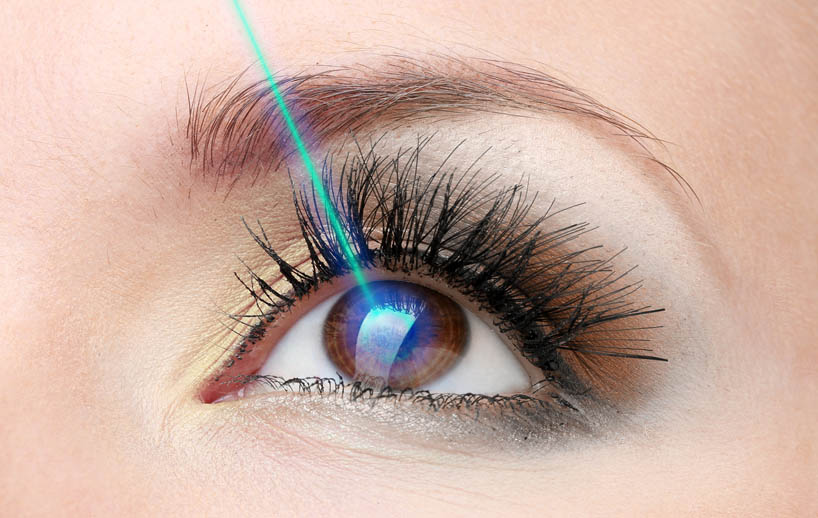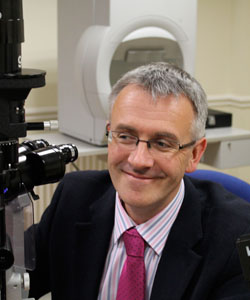Cataract

Assessment, bespoke surgery, laser treatment:
Cataract surgery is a commonly performed microsurgical procedure to improve your sight, once your own optician (optometrist) can no longer help with a glasses change. During the 15 minute procedure, the cloudy lens is removed from your eye using an ultrasound probe via self-sealing suture-less micro incisions, followed by the insertion of a foldable intraocular lens implant (IOL): this is called phacoemulsification. Although routine, it is a delicate and precise operation. Your optician or GP will refer you to me privately, by name. At your first consultation, I will assess your eye condition including taking state-of-the-art optical laser biometry measurements. I will discuss the operative, intraocular lens implant and optical options with you in detail, including the small risks of surgery. Sometimes surgery is not recommended or other eye conditions are detected. If cataract surgery is recommended, a date for the day case surgery can usually be arranged within 3-6 weeks; sometimes sooner, to suit you. If you wear contact lenses, you will need repeat measurements after a period of no-contact-lens-wear for about 3 weeks. You will receive a detailed information booklet about your proposed cataract surgery. I see you again immediately before surgery; then in theatre, and then afterwards on the ward; and finally a few weeks later for a final checkup in the clinic. At this point you are usually discharged to annual review by your own optician. If the second eye is to be operated on, this can usually be done within a week or two of the first. You will have continuity of care: confidence of having your condition managed by the same doctor throughout your surgery and pre- and post-op care, and easy access to me if you have any problems, with the confidence that you have direct access to me and I will resolve any post-operative problem you may have.
Surgery
This is performed in Albyn’s excellent purpose-built Theatre 3 with a brand new Phacoemulsification machine and ceiling-mounted Zeiss microsurgical microscope. A variety of different intraocular lenses are stocked, and “premium” multifocal and toric lenses can also be used, although these are not suitable for everyone. I use topical anaesthetic for local anaesthetic (meaning eye-drop anaesthesia only and no injections). Sometimes a patient may prefer a General Anaesthetic or this may be recommended for the safety of your eye surgery: in either case, my Consultant Anaesthetist is always present during your surgery: and will meet you on the ward prior to theatre. Your surgery is performed while you lie on a theatre table for 15 minutes; and a nurse holds your hand throughout. The surgery is painless. I can give you a running commentary if you wish! Afterwards you return to your private room on the ward for refreshments; and once I have checked you again, usually around 45 minutes later, and given you detailed and printed post-operative instructions, you may go home with your eyedrops and eye shield. If you have a General Anaesthetic – and many who come to the Albyn prefer this – you will usually be in hospital a few hours longer; and although you may still return home, you must have someone to stay with you overnight, and must avoid driving the next day.
Results
The outcome of cataract surgery, assuming careful assessment and delicate uncomplicated surgery, are usually excellent with restoration of full visual function. Whilst I usually aim to leave you with excellent clear unaided distance vision (which most patients opt for), a pair of glasses for winter or night driving may be required: your own optician will advise when they see you a few weeks after surgery. I perform continuous audit of my cataract outcomes. My surgical results are excellent, and far exceed the Royal College of Ophthalmologist’s benchmark gold standards. I have a personal complication rate much lower than the national UK average. I perform regular weekly adult cataract surgery in my NHS post. In cases of congenital and developmental cataract, I also perform surgery on babies and children at the Royal Aberdeen Children’s Hospital.
Laser
I offer laser treatment for posterior capsular opacification after cataract surgery. This is a fairly common occurrence that may present months or years after your cataract surgery and lens implantation. Laser Capsulotomy is a quick procedure, performed as an out-patient, which rapidly and completely restores the vision to its post-operative state. Opticians are excellent at detecting this, and would refer you back to me for laser if necessary.
Costs
Please see FAQ: How much does surgery cost?

Mr. Christopher Scott
MB ChB FRCOphth
Consultant Ophthalmologist
BMI Albyn Hospital
21-24 Albyn Place
ABERDEEN
AB10 1RW
Appointments:
Call 01224 595993
or book online
